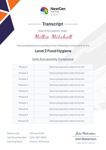Payroll, Taxation and National Insurance Contributions
Accredited By CPD | High-quality Materials | Video Lessons | Lifetime Access | 24/7 Tutor Support
NextGen Learning
Summary
- Exam(s) / assessment(s) is included in price
- Tutor is available to students
Add to basket or enquire
Overview
he payroll industry in the UK is continuously evolving, with the value of the payroll outsourcing market expected to reach £1.2 billion by 2024. This growth presents numerous opportunities for those skilled in payroll management. Our comprehensive Payroll, Taxation and National Insurance Contributions course equip you with the knowledge needed to excel in this thriving sector. In addition to mastering payroll management, you'll learn about taxation and national insurance contributions, providing a well-rounded understanding of the field. Enrol in our Payroll Management Course today and unlock a world of possibilities in payroll and beyond.
Learning Outcomes:
- Understand the UK payroll system and its basic components.
- Set up company and legislative settings in payroll software.
- Implement pension schemes and manage pay elements for employees.
- Accurately process payroll for different months, including special situations.
- Utilise e-submissions and maintain comprehensive employee records.
- Perform year-end procedures and access reports for historical data analysis.
CPD
Course media
Description
Course Curriculum
- Module 01: Gain an understanding of the UK payroll system and its components.
- Module 02: Learn payroll basics, including terminology and calculations.
- Module 03: Explore company settings in payroll software and their implications.
- Module 04: Understand the impact of legislation settings on payroll management.
- Module 05: Learn the basics of pension schemes and their setup in payroll systems.
- Module 06: Manage various pay elements such as salary, bonuses, and deductions.
- Module 07: Identify the importance of the processing date in payroll processing.
- Module 08: Learn how to add existing employees to a payroll system.
- Module 09: Understand the process of adding new employees to the system.
- Module 10: Discover the basics of payroll processing, including calculations and reporting.
- Module 11: Learn how to enter payments and manage employee payment records.
- Module 12: Understand the importance of pre-update reports and their use in payroll.
- Module 13: Update employee records and ensure accuracy in payroll processing.
- Module 14: Explore e-submissions basics and their role in modern payroll management.
- Module 15: Process payroll for November, understanding month-specific considerations.
- Module 16: Manage employee records and generate insightful reports.
- Module 17: Edit employee records to maintain up-to-date and accurate information.
- Module 18: Process payroll for December, including year-end considerations.
- Module 19: Learn how to reset payments and handle payment adjustments.
- Module 20: Understand the Quick SSP system and its implementation.
- Module 21: Manage the process when an employee leaves the company.
- Module 22: Conduct the final payroll run, ensuring accurate year-end reporting.
- Module 23: Access and analyse reports and historical payroll data.
- Module 24: Perform year-end procedures, including closing processes and reporting.
Certification
Upon completion of the course, learners can obtain a certificate as proof of their achievement. You can receive a £4.99 PDF Certificate sent via email, a £9.99 Printed Hardcopy Certificate for delivery in the UK, or a £19.99 Printed Hardcopy Certificate for international delivery. Each option depends on individual preferences and locations.
Who is this course for?
This Payroll Management Course is suitable for individuals looking to establish a career in payroll management, taxation, or human resources. In addition, it is ideal for professionals seeking to upgrade their payroll and taxation skills or those interested in starting their own payroll services business. The Payroll Management Course covers essential aspects of payroll, tax, and national insurance contributions, ensuring participants are well-equipped to handle various payroll scenarios and compliance requirements.
Career path
- Payroll Administrator - £20,000 to £30,000/year
- Payroll Officer - £22,000 to £35,000/year
- Payroll Supervisor - £25,000 to £40,000/year
- Tax Specialist - £30,000 to £60,000/year
- Payroll Manager - £35,000 to £50,000/year
- Human Resources Specialist - £24,000 to £45,000/year
Questions and answers
Currently there are no Q&As for this course. Be the first to ask a question.
Reviews
Currently there are no reviews for this course. Be the first to leave a review.
Legal information
This course is advertised on reed.co.uk by the Course Provider, whose terms and conditions apply. Purchases are made directly from the Course Provider, and as such, content and materials are supplied by the Course Provider directly. Reed is acting as agent and not reseller in relation to this course. Reed's only responsibility is to facilitate your payment for the course. It is your responsibility to review and agree to the Course Provider's terms and conditions and satisfy yourself as to the suitability of the course you intend to purchase. Reed will not have any responsibility for the content of the course and/or associated materials.




